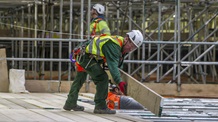What's the most important factor in getting residential construction right?
In an uncertain marketplace, consultants and construction companies are working harder than ever to secure their pipeline of work and ensure they can keep delivering sustainable growth.
In turn, developers are laser-focussed on ensuring that their development pipelines are in the right place and that they are offering the right product to consumers and investors.
Those consumers and investors – whether they are first time buyers or institutional investors buying homes by the dozen – drive behaviour across the entire market.
As the market gets tougher, that means that contractors and consultants need to be more mindful than ever of the behaviours that support our clients and help them win over customers.
Too often, in my experience, in these conditions, contractors focus on straight-forward cost reduction – or on how to best ensure that they protect their bottom line at all costs at the expense of their clients.
Some of that is due to our contract structures, which do not normally incentivise collaborative working across the supply chain. It is also a culture problem across both contractors and clients; we’ve been taught one way of operating and that’s the one we return to when times get tough.
For residential contractors, however, I believe that is a false economy.
Everyone in the sector will be working to differentiate themselves on price and programme, and before you know it we’ll be racing to the bottom again. That means a less sustainable sector where all the risk is transferred to those least able to take it – small supply chain companies – and no one benefits from that. Quality, delivery and service usually then suffer.
Instead, as a sector, we need to take a different approach. Your client – and their customer – has a very clear set of desires, and the best results are achieved when we focus on delivering those needs effectively.
For me, this means two main things:
Stay flexible
Firstly, you must be flexible. Developers know who they are selling to and they know what their audience wants. There is no reason that contractors can’t develop that understanding as well – particularly if they can draw on expertise from their wider business.
To keep their sales competitive, sometimes clients will ask us things that are challenging – whether that’s building a sales suite on the top floor of a building that is under construction, or opening retail units on the ground floor well in advance of the original programme agreement.
If we try harder to understand their incentives – and we recognise the impact that those challenging requests can make to their return on investment – then we can approach them in a much more responsive and collaborative way.
The changes may come with costs, but they also have great value to our clients – and so they shouldn’t always have to come with arguments and refusals.
A quality service
Secondly, quality must be an absolute priority.
As developments get tight on margin, ‘value engineering’ becomes the scourge of quality. Scopes shift quickly and suddenly you end up with a finished product that looks nothing like the drawings and is bound to disappoint residents and tenants.
In this market, good contractors must take a more considered approach to the services they can offer their clients.
With enough insight and a strong enough supply chain, a good contractor should be able to offer a holistic review of a cost plan that can identify savings without undermining the quality of the end product. We can help our client spend their monies smartly in the areas that really add value and enhance their sales opportunities.
It won’t always be possible but if done with care and by the right team, there is no reason why programmes can’t be adjusted to improve value without impacting on the end result.
If contractors can’t understand what developers need from us, we’re destined to fail and the sector as a whole will end up in the same endless cycle of litigious behaviour.
We can’t respond to a challenging market by reverting to type – we need to find new ways to work together.
Organisations like Build UK and the CLC are working hard to develop a new vision for the construction sector – but in the meantime, the most important thing is to work harder to understand your clients – and their customers.
That means drawing on experience from across your organisation – whether that’s a development colleague or a consultant – to understand how you can enable your client to deliver a better result.
















